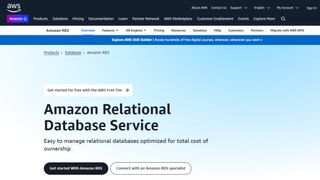Leading Database Providers for Scalable Solutions in 2024
Leading Database Providers for Scalable Solutions in 2024
Blog Article
Trick Functions to Seek When Choosing a Data Source Supplier
Picking a data source copyright is an essential decision that can considerably influence your company's information and procedures management approach. Amongst the essential features to consider are scalability options, which guarantee that your system can adjust to growing demands.
Scalability Options
When choosing a database company, comprehending scalability options is critical to ensuring that the selected option can fit future growth. Scalability describes the capability of a database system to expand its capacity and performance in response to enhanced demand. There are two key kinds of scalability: horizontal and upright.
Upright scalability, or "scaling up," includes enhancing a solitary web server's resources, such as CPU, RAM, or storage space. This technique can be simple and economical for smaller sized applications yet may get to a limitation where even more upgrades are impractical or as well costly.
Horizontal scalability, or "scaling out," entails adding more servers to distribute the tons. This approach enables for higher flexibility and can suit substantial boosts in information quantity and user traffic (database provider). It is specifically valuable for cloud-based database remedies that can dynamically allocate sources based on need

Security Procedures

When assessing safety and security steps, think about the execution of security methods (database provider). Data-at-rest and data-in-transit file encryption are important to make sure that sensitive information continues to be safeguarded, even in case of a safety and security violation. Furthermore, try to find carriers that use strong authentication devices, such as multi-factor authentication (MFA), to even more boost accessibility control
Routine protection audits and compliance with sector standards, such as GDPR or HIPAA, are indicative of a provider's dedication to information protection. Furthermore, make inquiries regarding their event reaction plan; a robust strategy can reduce the influence of any type of potential safety event.
Efficiency Metrics
Assessing performance metrics is essential for companies to make certain that their picked database service provider satisfies functional requirements. Trick performance metrics consist of reaction throughput, time, and scalability, which collectively determine the performance of data source operations under varying lots.
Action time is important, as it shows just how quickly the data source can refine inquiries and return outcomes. Organizations needs to search for metrics he said that show ordinary reaction times throughout optimal and off-peak hours. Throughput, typically gauged in transactions per second (TPS), supplies understanding right into the database's ability to manage high quantities of demands without efficiency destruction.
Scalability examines the data source's capacity to grow with the organization's requirements. A robust data source copyright should demonstrate horizontal and vertical scaling capacities, enabling smooth adjustments as needs change. In addition, recognizing latency, specifically in dispersed systems, can aid companies evaluate the responsiveness of the data source across different geographical locations.
Customer Support
Dependable customer assistance is a foundation of efficient database monitoring, giving companies with the support needed to resolve concerns and optimize efficiency. When choosing a database service provider, evaluating the degree of consumer support they supply is crucial. A durable support system need to include several channels of communication, such as phone, e-mail, and live chat, guaranteeing that users can access aid whenever they need it.
Furthermore, responsive assistance teams that are readily available 24/7 substantially improve the integrity of the database solution. Trigger response times and efficient resolution of issues can dramatically decrease downtime and boost general productivity. It is likewise advantageous to think about the availability of specialized support workers, that can provide customized assistance based on a company's specific requirements.

Pricing Framework
When considering a data source service provider, the rates structure is a pivotal aspect that can substantially affect a company's budget and total technique. A clear and versatile rates Clicking Here version is crucial for lining up the data source costs with service needs - database provider. Organizations ought to evaluate whether the prices is based upon consumption, per individual, or a level rate, as each design can produce various financial ramifications with time
It is necessary to assess any additional expenses connected with the supplier's services, such as data storage charges, purchase costs, and support charges. Some carriers might offer tiered prices, enabling scalability as the company expands, while others could impose strict limits that might end up being expensive as information needs raise.
Moreover, organizations ought to think about the long-lasting worth of the data source option. While reduced initial costs can be attractive, they might not account for future upgrades, upkeep costs, or assimilation prices. Performing a comprehensive cost-benefit analysis will help identify the most suitable rates structure that balances support, scalability, and performance, eventually guaranteeing that the selected database provider lines up with the company's monetary and operational goals.
Conclusion
In conclusion, choosing a data source company demands cautious factor to consider of various important features. Assessing efficiency metrics makes it possible for the identification of effective data sources, and available client assistance enhances the general customer experience.
Picking a database supplier is a crucial decision that can dramatically impact your organization's data and operations click to read monitoring method.When selecting a database company, comprehending scalability alternatives is critical to making certain that the chosen service can fit future development. When picking a database copyright, evaluating the level of customer support they provide is necessary.When taking into consideration a data source provider, the pricing structure is a pivotal factor that can considerably affect an organization's budget plan and overall technique. Carrying out a complete cost-benefit evaluation will certainly assist determine the most appropriate pricing structure that stabilizes efficiency, scalability, and support, ultimately ensuring that the selected data source supplier lines up with the organization's financial and functional objectives.
Report this page